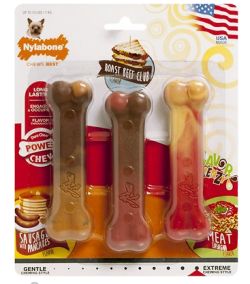Like many of the other chews we’ve discussed already, hard plastic and hard nylon chew toys like Nylabone® can be too hard for your dog’s teeth. These toys have little to no give, and as a result, they have led to many tooth fractures.
Nylabones are a popular chew toy among pet owners, providing hours of entertainment and exercise for their four-legged friends. Unfortunately, many pet owners have questions about the safety of this toy for their pup. Are Nylabones too hard for dogs teeth? In this blog post, we will discuss the potential risks and benefits of this particular chew toy, so that pet owners can decide for themselves if Nylabones are suitable for their pup. We will look at the materials used to manufacture this toy, the effects of excessive chewing, and the potential benefits of using a Nylabone. We will also discuss the importance of monitoring your pup’s playtime with any chew toy and provide some tips for keeping your pup safe. By the end of this post, pet owners will have the information they need to decide if Nylabones are appropriate for their pup or if they should look for a different type of chew toy.
What Do Vets Recommend for Dog Chews
Due to their high protein and fat content, which is beneficial for dogs’ teeth and gums, some veterinarians suggest milk-bone original brushing dog chews as a good option for canines.
Others advise purchasing Greenies teenie dental dog treats because they are healthy for dogs’ teeth and bones and low in sugar.
-Some veterinarians advise giving dogs oraVet dental hygiene chews because they are high in calcium and vitamin E, both of which are beneficial for dogs’ teeth.
Others advise choosing Pedigree Dentastix Large Original Dog Treats because they are low in sugar and have a lot of calcium and vitamin E.
-Some people advise buying an arm & hammer gorilla chew toy because it contains a lot of protein and fat, which is good for dogs’ teeth and gums.
-Others recommend virbac c. e. t. Because they are high in calcium and vitamin E and low in sugar, dental dog treats are a good option.
Bottom Line: Are Nylabones Safe for Dogs?
A wide variety of products are available from Nylabone, some of which carry higher risks than others. Nylabones, however, can be as secure as any other hard chew toy overall.
To prevent your dog from getting hurt or ill while chewing, practical safety precautions are necessary.
For the safest chewing experience, always:
Remember: If your dog is hurt or ingests a piece of Nylabone larger than a grain of rice, call your veterinarian right away.
This is a sponsored post in which the advertiser has paid a fee to be included. Learn more.

Nylabones are a synthetic product that are very hard and may break teeth because they are so hard. They’re unlikely to get shattered and splintered, and so swallowed. The pain and health risks associated with tooth fractures alone should convince you never to give your dog a Nylabone. We definitely shouldnt ignore this risk.
Now onto my first question, which comes from Bexy Boo, who asks what my opinion is on Nylabones and other dog chews of a similar nature. Her Lab occasionally enjoys chewing on them as well as on objects like antlers and yak milk bars.
Consideration should be given to oral health because it is crucial to overall body health. There are many other things we should do, as I mentioned, but if you’re looking for dental-specific chews, you want to look for the VOHC seal of approval. This also applies to other oral care items like toothpastes and the like.
Now theyre not the be all and end all. They won’t completely get rid of tartar, and they won’t completely get rid of the need for other dental healthcare procedures. Therefore, to keep things tidy and clean, that could include brushing your teeth, following a dental diet, and engaging in periodic health cleaning.
So what are my preferences then? While I prefer the strong rubber chew toys like the ubiquitous Kong. I think theyre fantastic. Kong’s need to be an appropriate size and they need to be an appropriate hardness for your dog. So theres no point giving a small breed Kong to a big large Labrador, because they potentially are going to swallow it or it’s going to get stuck and theyre going to choke. Also if youve got a power chewer then you want to use one of the harder, tougher black versions rather than the classic red version, which are a little bit softer.
FAQ
Do vets recommend Nylabones?
Vets recommend Nylabone products, so any chew toy from this company is a sure bet.
Can nylon bones hurt dogs teeth?
Many nylon bones are made of hard materials that can harm your pet’s teeth, despite being advertised as a safe alternative to other chewing objects. Choose chew toys that are tough enough so that your pet cannot tear them to pieces while still being soft enough to indent when you press your thumbnail into them.
When should you throw away a Nylabone?
If you’re unsure of when to discard Nylabones, you should replace them when the knuckle ends become worn or if they become too small for your dog to safely chew (if they become so small that your dog could swallow them, discard them).
How do you soften a Nylabone?
Texturize It. Speaking of textures, chew toys with more ridges stimulate the mouth more than toys with smoother surfaces. Toys with irregular shapes and different patterns of ridges and nubs will massage your dog’s gums more and add interest to his chewing sessions.
